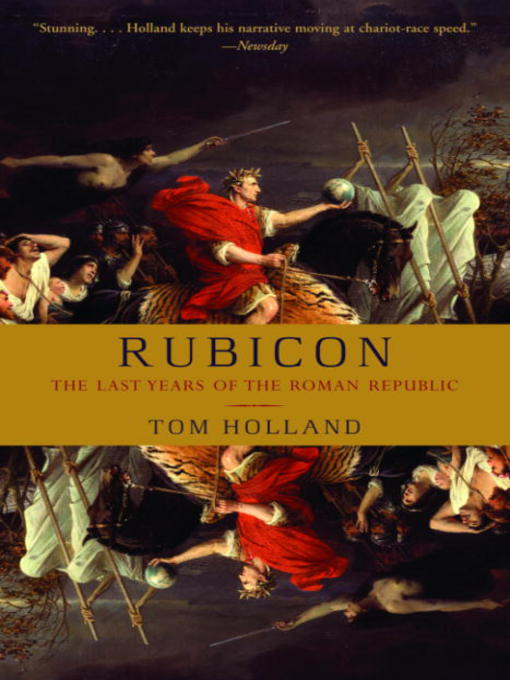- All Magazines
- Popular Magazines: Always Available
- Cooking and Food Magazines
- Craft Magazines
- News and Politics
- See all magazines collections
“A fascinating picture of Roman city life. . . . In every aspect of this story, Holland expertly makes the Romans, so alien and yet so familiar, relevant to us.” –Los Angeles Times
“Stunning. . . . Holland keeps his narrative moving at chariot-race speed.” –Newsday
In 49 B.C., the seven hundred fifth year since the founding of Rome, Julius Caesar crossed a small border river called the Rubicon and plunged Rome into cataclysmic civil war. Tom Holland’s enthralling account tells the story of Caesar’s generation, witness to the twilight of the Republic and its bloody transformation into an empire. From Cicero, Spartacus, and Brutus, to Cleopatra, Virgil, and Augustus, here are some of the most legendary figures in history brought thrillingly to life.
Combining verve and freshness with scrupulous scholarship, Rubicon is not only an engrossing history of this pivotal era but a uniquely resonant portrait of a great civilization in all its extremes of self-sacrifice and rivalry, decadence and catastrophe, intrigue, war, and world-shaking ambition.
-
Creators
-
Publisher
-
Release date
December 18, 2007 -
Formats
-
Kindle Book
-
OverDrive Read
- ISBN: 9780307427519
-
EPUB ebook
- ISBN: 9780307427519
- File size: 3193 KB
-
-
Languages
- English
-
Levels
- Lexile® Measure: 1140
- Text Difficulty: 8-9
-
Reviews
-
Publisher's Weekly
November 24, 2003
After a palace coup demolished the reign of King Tarquin of Rome in 509 B.C., a republican government flourished, providing every person an opportunity to participate in political life in the name of liberty. As Holland, a novelist and adapter of Herodotus' Histories
for British radio, points out in this lively re-creation of the republic's rise and fall, the seeds of destruction were planted in the very soil in which the early republic flourished. It was more often members of the patrician classes who had the resources to achieve political success. Such implicit class distinctions in an ostensibly classless society also gave rise to a new group of rulers who acted like monarchs. Holland chronicles the rise to power of such leaders as Sulla Felix, Pompey, Cicero and Julius Caesar. Some of these leaders, such as Pompey, appealed to the masses by expanding the republic through military conquest; others, like Cicero, worked to reinforce class distinctions. Holland points to the suppression of the Gracchian revolution—a series of reforms in favor of the poor pushed by the Gracchus brothers in the second century B.C.—as the beginning of the end of the republic, providing the context into which Julius Caesar would step with his own attempts to save the republic. As Holland points out, Caesar actually precipitated civil wars and helped to reestablish an imperial form of government in Rome. With the skill of a good novelist, Holland weaves a rip-roaring tale of political and historical intrigue as he chronicles the lively personalities and problems that led to the end of the Roman republic. Maps. Agent, Patrick Walsh.
-
Formats
- Kindle Book
- OverDrive Read
- EPUB ebook
subjects
Languages
- English
Levels
- Lexile® Measure:1140
- Text Difficulty:8-9
Loading
Why is availability limited?
×Availability can change throughout the month based on the library's budget. You can still place a hold on the title, and your hold will be automatically filled as soon as the title is available again.
The Kindle Book format for this title is not supported on:
×Read-along ebook
×The OverDrive Read format of this ebook has professional narration that plays while you read in your browser. Learn more here.

